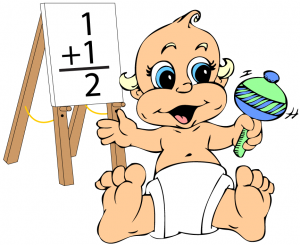ETA: On January 4th, 2012 we welcomed our son, Carston, into the world. Two days later, his daddy's research on value-added teachers appeared on the front page of The New York Times. Coincidence?! Everyone is doing well and no one has been fired yet! I was correct (per original post below) that this work would get a lot of attention. What do you think? My husband, John Friedman, and I are expecting our first child in about three weeks. Both of us have spent parts of our careers studying education, childhood, and competition in various forms. I can't decide if this is going to be good for our offspring, or a total disaster...
John, and several colleagues (including Raj Chetty, Nathaniel Hilger, Emmanuel Saez, Diane Whitmore Schanzenbach, and Danny Yagan), recently published the lead paper in The Quarterly Journal of Economics: "How Does Your Kindergarten Classroom Affect Your Earnings? Evidence from Project Star." (If you would like to read a full version of the manuscript, click here.) In the paper they find evidence that your kindergarten classroom has significant, longitudinal effects on your life, using data from students who were part of Project STAR, a Tennessee program in the early 80s that randomized children into kindergarten classrooms. These effects include higher earnings, college attendance, home ownership, and retirement savings. I guess Robert Fulghum was right that all you really need to know you learned in kindergarten. Can you imagine the kinds of questions we are going to ask before enrolling our child in a kindergarten?!
Currently John is working on another paper (again, with Raj Chetty, and also with Jonah Rockoff), that will surely get a lot of attention as it focuses on the long-term impacts of teachers-- not just kindergarten teachers. To oversimplify things, teachers who improve students' standardized test scores also improve adult earnings. A one standard deviation increase in test score raises earnings by about 10% of your yearly salary per year. Really interesting stuff, but I can't imagine the kinds of questions John is going to ask at school open houses and parent-teacher conferences!
As for me, if you read this blog you know that I study kids and competition and various afterschool activities. So can you imagine the kinds of questions I am going to ask sports coaches, music teachers, etc.? Since I also write about how these issues often intersect with schooling and college admissions I know how important early education can be. Recently I checked out websites of some schools around our house to see about tuition and admissions requirements for pre-K, if we go the private school route. Now, if I lived in some cities (oh, like one Big City a couple hundred miles south of Boston), I would be quite behind if I hadn't already been reading up on the options and gotten myself on mailing lists. Despite being one of the great intellectual centers of the world, Boston isn't quite as intense as this other Big City. Nonetheless, I started filling out an online form to request more information on a particular school, figuring I have some downtime to read up on places. When I got to the section on child's info (like name, grade interested in, birth date, etc.), I suddenly realized that putting my due date in as an upcoming birthday would likely not be looked upon kindly by the Brahmin elite! I wouldn't want to flag myself as a Tiger Mom before I'm even officially a mom... especially because I'm not quite sure I will be a Tiger Mom, preferring more of a "buffet" approach to early childhood parenting.
What do you think: son lucky to have parents who study these issues, or destined for a lifetime of therapy? Personally, I hope for something in between, so if you have any suggestions, feel free to pass them on!
